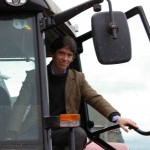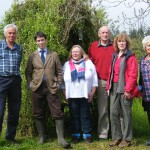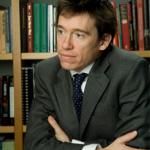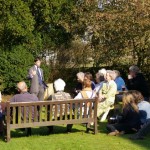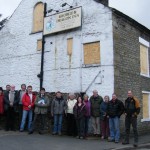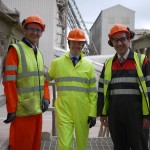SCENES FROM THE BRITISH ELECTION
Article first published by Inigo Thomas in Slate on 30 April 2010.
In 1998, 25-year-old Rory Stewart, a former British army officer on a Foreign Office posting to Jakarta, Indonesia, took a month’s leave to walk through the jungle of Papua New Guinea. After three weeks inching through the forest, Stewart reached a village on the island’s southern shore. “One could walk from Paris to Berlin in that time with much more ease,” he later wrote. With more ease? Not many people can imply, without affectation, that the 550 miles from Paris to Berlin is a 21-day stroll.
After his Far Eastern posting, Stewart was made the British representative in Montenegro. Then he left the Foreign Office and spent two years walking from Iran to Nepal, passing through Afghanistan, Pakistan, and India, later writing a prize-winning book about his journey, The Places in Between. Following the invasion of Iraq, he was appointed deputy governor of two provinces in southern Iraq and afterward wrote a book, The Prince of the Marshes, which was critical of the chaotic postwar planning he witnessed. In 2006, he started the Turquoise Mountain Foundation in Kabul, Afghanistan, one of whose aims is to assist the city’s architects, masons, and artisans to rebuild the long-wrecked Afghan capital. He was made a professor at Harvard in 2008 and appointed director of the Carr Center on Human Rights Policy at the Kennedy School of Government. In 2009, he was selected as the Conservative Party candidate for Penrith in the north of England, and he continues to mark papers from his last semester at Harvard as he campaigns.
There isn’t anyone quite like Stewart. “It’s hardly unusual for a posh-Scot old Etonian ex-army officer with diplomatic experience to be parachuted in as a safe-seat Tory,” wrote the left-inclined, usually Tory-detesting Deborah Orr in a Guardian column last fall. “It’s more unusual for me to love him, though; to just simply adore and worship him. Stewart is a truly heroic figure.” Which might strike some as overblown enthusiasm, except Orr is not the only commentator to see in Stewart something they don’t see in others, regardless of their politics. “It would be easy to think that men such as Mr Stewart no longer exist,” said the Times two weeks ago in an editorial endorsing Stewart’s candidacy. “Westminster needs more politicians who know the facts on the ground, and know their own minds. Mr. Stewart is one of those.”
So why would Orr’s truly heroic figure give up academia, where he’s been in a position to influence and to sharply criticize U.S. and U.K. policies regarding Afghanistan? Why seek to join a much-tarnished branch of government? Why become a member of Parliament when free thinking is often subordinate to party line and when the scrutiny exerted by the British press is often akin to a public mugging?
“No one asked me that question in America,” Stewart says, when asked about his decision to become a politician. He’s speaking on a cell phone from the car that’s taking him to his next campaign stop. He talks about his decision to stand for Parliament less as a calling or a professional decision than the next thing he is going to do.
“It’s definitely that road,” I hear him tell his driver. He does know where he’s going. To familiarize himself with the constituency he hopes to represent, Stewart undertook another of his epic walks, traveling 300 miles over the sheep-dotted hills of Penrith. By his standards, the walk was short. It requires little imagination to picture this scene: Stewart knocks on a farmer’s door in the middle of nowhere and says he happens to be passing by—on foot—and he wants to be the farmer’s MP. The reasonable first reaction of that farmer might be: Isn’t this man mad? The second: Maybe he’s not.
Penrith is, by British standards, a huge constituency: It’s the largest in England, covering 2,000 square miles of hill country. Modern, multicultural, Twittering Britain it isn’t. Much of its population is offline and static—few people move in, few move out, and few refresh their browsers very often, because they don’t have high-speed Internet access. The surnames on the gravestones are much the same as those in the phone book. “It’s astonishing how many people are related to each other,” says Stewart. There are hundreds of small-holding farmers, many of whom live in isolated valleys: Twenty-five percent of the population is self-employed, which is double the national average. He says a lot of the constituents are solitary types whose main social activity is centered on the livestock auctions in Penrith. Pride in independent-mindedness is widespread. The phone connection breaks up; when he returns Stewart says cell-phone reception and Internet access is more reliable in Kabul than it is in the far north of England.
In a piece he wrote about Afghanistan last year, Stewart attacked American and British attempts to win over Afghans and to counter the Taliban. At fault, he said, was an obsession with the language of management; everything is perceived in terms of targets and whether they are met. Objectives are listed bullet point after bullet point, like ingredients for a shapeless recipe. There’s too much confidence among U.S. and the British forces in Kabul, Stewart argued; they’re too much persuaded by data-driven presentations and know less than they think. A year later, Stewart’s view appears to have been heard: In a New York Times report published earlier this week, a U.S. general was quoted saying that the managerial style had become a risky obsession: “It’s dangerous because it can create the illusion of understanding and the illusion of control. Some problems in the world are not bullet-izable.” Or bulletproof.
Not that Stewart perceives a sea change on the horizon. “The U.S. finds it difficult to accept that it will never secure legitimacy in Afghanistan,” he says. As for the United Kingdom, Stewart believes that under Tony Blair, Gordon Brown, and the Labor Party, the country has failed to have a foreign policy. “In the U.S. at least there’s serious discussion about policy, while in the U.K. there isn’t, and the difference is as striking as day and night.”
What’s true of Afghanistan is just as true of Penrith, according to Stewart. His potential constituents must face the fact that their local government, the Eden Valley Council, also perceives its objectives in terms of what it can manage and regulate. It’s this unnecessary intrusiveness of the state, Stewart says, that makes him a Conservative. Pettiness prevails, and to illustrate his point, he tells the story of a librarian who was told by the council that he wasn’t allowed to change light bulbs in the council-run library. Health and safety regulations mean that an electrician has to be called out from miles away. The agricultural college on the outskirts of Penrith is under threat of closure, Stewart says, because it’s said to be losing more than $6 million a year. What about its graduates, Stewart asks. Don’t they count for something?
Few local issues in Britain are as raw as the arrival of one of the big supermarket chains. Actually, it’s mistake to call it a local issue, because it isn’t. It’s a nationally known phenomenon. In Saxmundham, for example—a small town in faraway eastern Suffolk—a Waitrose supermarket opened several years ago; now Tesco hopes to build a second supermarket in the same town. For those who oppose the dominance of these stores on Britain’s high streets, the possible arrival of a second supermarket in Saxmundham is a disaster. What can the smaller shops do, other than close?
In Penrith, Sainsbury’s is hoping to open a new 55,000-square-foot supermarket. “There are haberdashers and grocers that have been in business since the 1740s,” Stewart says. There’s often too little public consultation. Bureaucrats in Penrith and in London hoard figures and sit on already made decisions, making it difficult for those without access to such information to make informed and substantive criticism.
Unlike the outcome of the general election, the May 6 vote in Penrith is pretty certain. Stewart may have Labor and Liberal Democrat rivals; there are candidates standing for the British National Party and the U.K. Independence Party, too. But the last time another party came close to ousting the Conservatives was 27 years ago. Stewart should win the election in this remote and rugged constituency, which some would call bleak.
“The hawthorns are just coming into bloom,” he says. “You must come and visit.” With his capacity to make the bleak sound good, it’s hard to think of anything else to say but: Why not.






